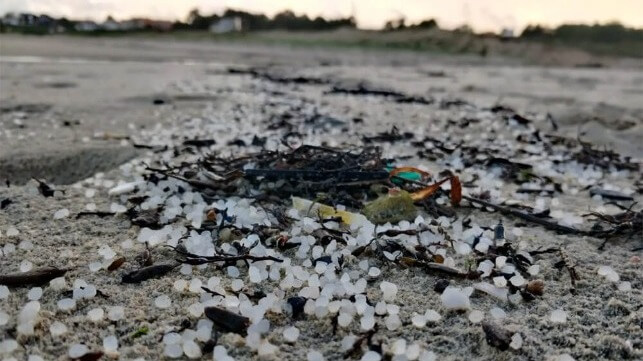Container Lost off Maersk Ship Spills Raw Plastic on Spain’s Beaches

Nearly a month after environmentalists and local officials began calling attention to plastic nurdles washing up on Spain’s beaches, the federal government is opening a formal investigation. The source of the small plastic balls used in the manufacture of plastic water bottles and similar food packing has been traced to a containership operating under charter to Maersk.
Environmentalists working with Spain’s Ecologistas en Accion, an environmental organization, began finding the small plastic bits washing up on the shoreline primarily in the Galicia region as soon as December 13. Volunteers began scouring the beaches collecting the small plastics while fears grew about how much might have been lost into the ocean. The environmental group is saying there could be billions of the nurdles floating in the ocean and coming ashore as they raise the alarm about the impact on fishing and the food chain.
Investigations traced the source of the nurdles to a containership that lost six boxes overboard on December 8 approximately 50 miles west of the coast of Portugal. Due to currents, most of the plastic has been found on Spanish beaches in Galicia as well as some in Asturias, although some reports are saying traces of it have reached the beaches of France.
The ship, the Liberia-registered Toconao (116,000 dwt) was sailing the Bay of Biscay from Algeciras to Rotterdam. It operates between the Mediterranean and Northern Europe currently under charter to Maersk and managed by Columbia Shipmanagement of Singapore. Built in 2003, the ship has a capacity of 8,600 TEU.
Six of the containers went overboard with Maersk saying that none of the container cargo is officially listed as hazardous material. There is no word about what else was in the boxes, but one of them contained 1,050 bags of the nurdles (less than 5 millimeters in size). Each sack is reported to hold 55 pounds of the nurdles. Greenpeace estimates that are 22,500 nurdles per pound which means there could have been nearly 1.3 billion nurdles in the container. Maersk told the Associated Press that the vessel’s owners hired multiple cleanup specialists to support the efforts to remove the plastics from the beaches.

Volunteers have been attempting to collect the balls from the beaches (photo courtesy of Ecologistas en Accion)
Ecologistas en Accion, however, is not satisfied with the slow response to the clean-up process. They are critical of the government as well as the shipping industry. The activist group said in a statement on January 5 that it would file an environmental complaint against the owner of the vessel.

that matters most
Get the latest maritime news delivered to your inbox daily.
The problem of nurdles is well known, with calls to regulate or outlaw their shipment. Just a year ago, France threatened legal action when the plastics began washing up on the beaches of Brittany. Sri Lanka faced a similar problem in 2021 when the feeder ship X-Press Pearl burnt and sunk off Colombo. They have been cleaning nurdles from their beaches with environmentalists projecting a decade or more of repercussions.
Greenpeace, along with Ecologistas en Acción, Friends of the Earth, SEO/BirdLife, and WWF joined together in calling for greater coordination between Spanish authorities in response to the current pellet spill. At the same time, the groups are using the event to call broader attention to the problems of microplastics in the oceans.
